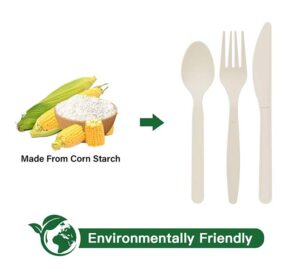This article explores the global rise of environmental awareness and the urgent need to replace single-use plastics. It highlights key government policies from the EU, China, India, the U.S., and Japan, and examines how industries such as foodservice, airlines, and retail are responding. Corn starch cutlery emerges as a safe, compostable, and eco-friendly alternative to plastic, supported by expert opinions and international sustainability goals. Finally, the article introduces DASHAN’s certified corn starch utensils as a practical solution for businesses and consumers committed to sustainable dining.
Introduction: A World Driven by Environmental Awareness
Over the past two decades, global awareness of environmental issues has surged to unprecedented levels. Rising concerns over plastic pollution, climate change, and waste management have shaped consumer behaviors, government policies, and industry practices. According to the United Nations Environment Programme (UNEP), the world produces over 400 million tons of plastic annually, and less than 10% is recycled effectively (UNEP, 2022). The remainder ends up in landfills, incinerators, and oceans, disrupting ecosystems and threatening human health.
This alarming reality has led to a search for sustainable alternatives. One such innovation is corn starch cutlery—a biodegradable, compostable, and eco-friendly solution that replaces traditional single-use plastics. Before delving into its benefits, let us first examine how countries around the world are addressing the plastic pollution crisis.
Global Policy Actions: How Nations Are Responding
Governments worldwide have recognized the urgency of reducing plastic waste and are implementing comprehensive policies to curb single-use plastics. Some notable examples include:
-
European Union (EU)
The EU Single-Use Plastics Directive (2019/904) bans items such as plastic cutlery, plates, straws, and polystyrene containers across all member states. The directive explicitly encourages the use of bio-based and compostable alternatives, providing a strong policy foundation for products like corn starch utensils. -
China
In 2020, China announced a phased ban on single-use plastics, including non-degradable straws and utensils, as part of its goal to achieve carbon neutrality by 2060. The government encourages the adoption of biodegradable materials such as PLA, PHA, and starch-based products. -
United States
While federal action remains limited, several states have introduced strong measures. For example, California’s SB 54 (2022) requires 65% of single-use packaging to be recyclable or compostable by 2032. New York and Washington, D.C. have also banned plastic straws and utensils in foodservice operations. -
India
India implemented a nationwide ban on single-use plastics in July 2022, covering items like cutlery, straws, and packaging films. With over 1.4 billion people, India’s move highlights the urgent need for scalable and biodegradable alternatives. -
Japan
Japan introduced the Plastic Resource Circulation Act (2022), which obliges businesses to reduce plastic usage and promote recycling. Many companies have shifted to biomass-based products, including starch-based tableware.
These policies collectively create an environment in which sustainable dining products are not just desirable—they are becoming mandatory.
Industry Responses: How Businesses Are Adapting
In response to consumer demand and regulatory pressures, industries across the globe are making significant adjustments:
-
Foodservice and Hospitality
Restaurants, hotels, and catering services are replacing plastic utensils with compostable alternatives. Global chains like McDonald’s and Starbucks have pledged to reduce plastic usage significantly, introducing biodegradable straws and cutlery in several markets.
-
Airlines and Travel
Airlines are particularly under scrutiny due to high waste volumes. Companies like Emirates and Qantas have started using biodegradable cutlery made from renewable sources, including corn starch, to support their zero-waste goals.
-
Retail and Supermarkets
Retail giants such as Walmart and Carrefour are shifting toward eco-friendly packaging and utensils, driven by consumer preferences and corporate sustainability commitments.
-
Corporate and Institutional Dining
Universities, government offices, and multinational corporations are adopting eco-friendly dining solutions in their cafeterias to meet ESG (Environmental, Social, Governance) standards.

Corn Starch Cutlery: A Sustainable Alternative

Corn starch cutlery is derived from renewable corn starch, a natural polymer extracted from corn kernels. Through processes like extrusion and injection molding, the starch is converted into biodegradable utensils—spoons, forks, knives, and sporks—that offer the same durability and usability as plastic cutlery.
Key Benefits:
-
Biodegradability
Unlike petroleum-based plastics, corn starch cutlery decomposes within months under composting conditions, returning to the soil as organic matter. -
Reduced Carbon Footprint
According to a study by the European Bioplastics Association, starch-based plastics emit 30–50% fewer greenhouse gases compared to petroleum plastics during their lifecycle. -
Food Safety and Health
Corn starch cutlery is non-toxic and food-contact safe, meeting international safety certifications such as FDA, EU 10/2011, and SGS standards. -
Versatility
Available in different shapes and strengths, corn starch utensils can be used across foodservice operations—from fast food to fine dining. -
Public Perception
Businesses adopting eco-friendly utensils benefit from enhanced brand reputation, aligning with consumer demand for sustainability.
Expert Opinions and Authority References
Experts emphasize the urgency of transitioning away from plastics:
-
Dr. Erik Solheim, former head of UNEP, stated:
“Plastic pollution is a planetary crisis, and we must embrace alternative materials to safeguard ecosystems and human health.” (UNEP) -
Ellen MacArthur Foundation highlights that a circular economy for plastics requires scalable bio-based alternatives, and starch-based materials play an essential role.
-
World Wildlife Fund (WWF) stresses that replacing plastic utensils with biodegradable options can prevent millions of tons of plastic waste from entering the oceans each year.
These perspectives reinforce the credibility and necessity of adopting products like corn starch cutlery.
Policy Support and Global Trends
The global shift toward biodegradable materials is further strengthened by international agreements and national sustainability goals:
-
The United Nations Sustainable Development Goals (SDGs), particularly SDG 12: Responsible Consumption and Production, explicitly encourage the adoption of renewable materials to reduce waste.
-
The Paris Agreement pushes nations to decarbonize industries, indirectly promoting bio-based products that emit fewer greenhouse gases.
-
OECD reports show that investment in biodegradable plastics is accelerating, with projections that the bioplastics market will grow by 15% annually through 2030.
Together, these frameworks create strong momentum for businesses and consumers to adopt corn starch cutlery.
Why Choose DASHAN Corn Starch Cutlery?
At DASHAN, we recognize that the future of dining lies in sustainability. Our corn starch cutlery is designed not only to meet global environmental standards but also to exceed customer expectations.
Advantages of DASHAN Cutlery:
-
Certified Quality: Compliance with FDA, SGS, and EU food safety standards.
-
Versatile Applications: From restaurants and catering to retail and airline services.
-
Eco-Friendly Manufacturing: Minimal water and energy use, with a commitment to carbon reduction.
-
Global Reach: Supporting businesses worldwide in meeting policy requirements and ESG commitments.
-
Brand Responsibility: By choosing DASHAN, customers contribute directly to global sustainability and a circular economy.
Conclusion: Toward a Plastic-Free Future
The fight against plastic pollution requires collective action from governments, industries, and individuals. With rising global awareness, strong policy support, and innovative solutions, the world is moving steadily toward sustainable dining practices.
Corn starch cutlery is more than just a product—it is a symbol of a new era of responsible consumption. Backed by expert opinions, policy frameworks, and proven environmental benefits, it provides a credible pathway for reducing plastic waste.
At DASHAN, we are committed to helping businesses and consumers make this transition seamless. By adopting our corn starch cutlery, you are not only complying with regulations—you are actively contributing to a healthier planet.
🔗 References
The policies, experts, and data mentioned in this article can be found in the following sources:
- UNEP – Plastic Pollution Report (2022)
https://www.unep.org/resources/report/plastic-pollution - European Union – Single-Use Plastics Directive (2019/904)
https://environment.ec.europa.eu/topics/plastics/single-use-plastics_en - California SB 54 – Plastic Pollution Prevention and Packaging Producer Responsibility Act
https://leginfo.legislature.ca.gov/faces/billNavClient.xhtml?bill_id=202120220SB54 - India – Ministry of Environment, Forest and Climate Change (Plastic Ban, 2022)
https://pib.gov.in/PressReleasePage.aspx?PRID=1836550 - Japan – Plastic Resource Circulation Act (2022)
https://www.env.go.jp/en/earth/cc/plastic.html - Ellen MacArthur Foundation – New Plastics Economy
https://ellenmacarthurfoundation.org/topics/plastics/overview - World Wildlife Fund (WWF) – Plastic Pollution
https://www.worldwildlife.org/initiatives/plastics - European Bioplastics Association – Bioplastics Market Data
https://www.european-bioplastics.org/market/
❓FAQ
Q1: What are corn starch cutlery products made of?
A1: They are made from renewable corn starch, processed into biodegradable and compostable utensils like spoons, forks, knives, and sporks.
Q2: Are corn starch utensils safe for food contact?
A2: Yes. They comply with FDA, EU 10/2011, and SGS standards, ensuring they are non-toxic and safe for food use.
Q3: How long does corn starch cutlery take to decompose?
A3: Under industrial composting conditions, they typically decompose within 3–6 months, returning to the soil as organic matter.
Q4: Which countries support corn starch cutlery through regulations?
A4: The EU, India, China, Japan, and several U.S. states have introduced bans on plastic cutlery, encouraging biodegradable alternatives like corn starch products.
Q5: Why choose DASHAN’s corn starch cutlery?
A5: DASHAN provides certified, eco-friendly, and durable products that align with global sustainability goals while offering versatile solutions for restaurants, catering, and retail.




